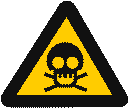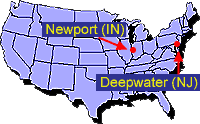 | CDC Recommends Caution about Nerve Agent Disposal |
 April 11, 2005
April 11, 2005Chemical weapons (nerve agents) are some of the most deadly substances in the world. At the US Army Newport Chemical Depot (Newport, Indiana), 1,269 tons of the nerve agent called "VX" sits in 1,690 containers. The Army wants to destroy the VX by treating it with chemicals. This treatment would make the VX less dangerous and create several million gallons of waste water called caustic VX hydrolysate (CVXH). The CVXH then would be transported from Indiana to Deepwater, New Jersey, where the CVXH would be treated and then dumped into the Delaware River. Most people would agree that it is a good idea to destroy the stockpiles of deadly chemical weapons. However, it is best to have a safe plan to dispose of these materials -- one that will not damage the environment or harm people and wildlife. |
|
Did you know?
|
|
|
References and further information:
|
 In April, 2005, the
In April, 2005, the 
![[email]](./gif/menue.gif)
![[survey]](./gif/menusur.gif)
![[newsletter]](./gif/menunew.gif)
![[search]](./gif/menusea.gif)